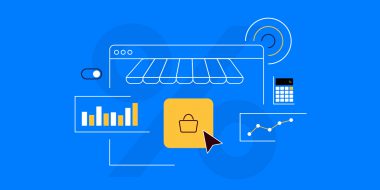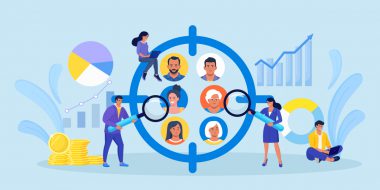HIGHLIGHTS
- Data analytics services are tools used to convert raw data into actionable insights for full-proof decision-making and optimizing performance.
- As per McKinsey, data-driven sales-growth engines in B2B contribute to 15% to 25% higher profits.
- Data analytics is transforming the B2B with advanced algorithms, accurate research, faster and better user experience, and robust benchmarking.
- The key to enhance B2B market research is utilizing predictive analytics to anticipate future performance, trends, opportunities, and customer behavior.
- The growing popularity of data analytics services can be attributed to new trends such as sentiment analysis, predictive analytics, personalization, and real-time insights.
It’s a tough market out there for B2B businesses. The digital landscape is crowded and standing out from the crowd requires a certain je ne sais quoi. And the answer lies in data analytics . In fact, McKinsey states that companies that master the art of implementing and execution of data analytics services are 1.5X more likely to outperform their competitors.
Several companies have recognized the potential of analytics in augmenting B2B success. They are in pursuit of ambitious investments in technology solutions to try and get a leg up. As a matter of fact, a leading chemicals company is in talks to sign a €1 billion investment opportunity. The multinational company aims to implement analytics for churn prediction, and in-season demand forecasting.
It looks like data analytics is the key to outperforming competitors. This blog will outline the impact of a data-driven approach in B2B research.
Let’s Decode Data Analytics Services
Imagine you have filled your pantry with all of the best quality fruits, vegetables, oils, and spices. But if you don’t have the skill to cook them, then that’s all they are. Ingredients. The real challenge is to make it into an actual meal. It’s the same story with data and data analytics. Data analytics services are tools that convert raw data into actionable insights for full-proof decision-making and optimizing performance.
As a result of digitization, a massive amount of data is available. To make sense of the data, it needs to be adequately utilized with advanced AI and ML algorithms, and modern data visualization tools. This results in the delivery of critical findings that have significant impacts for businesses: optimizing performance, enhancing customer experience, improving products/services, and overall efficiency.
Data analytics encompasses descriptive, diagnostic, predictive, and prescriptive analytics, each with a unique function.
| Descriptive Analytics | Diagnostic Analytics | Predictive Analytics | Prescriptive Analytics |
| Compiles historical data, identifies recurring patterns, and provides insights into past events | Assesses data to identify causes of certain events and uncovering correlations between different variables | Uses algorithms, linear/logistic regression models, etc. to forecast future patterns and scenarios | Predicts future outcomes and also recommends proactive measures using simulation techniques |
Market Research: Essential for B2B Success
An unsatisfied B2B buyer is an opportunity lost. With a multitude of options out there, buyers no longer feel the need to stay with a brand that doesn’t give them results. However, a lost customer can be a valuable learning experience to correct a mistake. It’s an opportunity to utilize market research services to understand the customer who left, and figure out how to retain existing ones. And if you do your research really well, you could potentially find ways to bring them back.
B2B market research empowers companies to:
- Create on-point B2B buyer personas and market segmentation
- Identify changes in customer behavior and needs
- Master competitive differentiation
- Track brand perception and performance
- Design an efficient product development cycle
- Achieve thought leadership
A repository of data supports evidence-based decisions, which improves financial performance, business strategy, marketing results, and more. According to McKinsey, data-driven sales-growth engines in B2B contribute to 15% to 25% higher profits.
The Future of B2B Market Research: Data Analytics Services
In this day and age, the only way to enhance ROI is to anticipate the future. Figure out the potential challenges you might encounter and the opportunities that you need to create to enhance your performance. The way to do that? Data analytics services. It can simplify market research, making it easier to gain insights into industry trends, customers, and competitors.
Here is how advanced analytics can enhance market research in B2B:
| Data is collected from sources like social media, sensor readings, financial records, customer transactions, etc. | Data is cleansed to eliminate errors, gaps, and anomalies for smoother data interpretation | AI and ML algorithms, data visualization tools, and statistical analysis identify industry patterns, and trends | Complex outcomes are translated into coherent charts, reports, and dashboards for informed decision making |
Top 4 Benefits of Data-driven B2B Market Research
Data analytics services are very powerful tools transforming the B2B with advanced algorithms, accurate research, faster and better user experience, and robust benchmarking. This insights-focused approach offers many benefits, including:
Reach the right customers
A targeted customer pool provides far more value than a broad pool. That’s where Data comes in. It helps identify and target ideal customers accurately with a detailed customer profile. What can data provide? A thorough overview of the customers, their industries, and their needs. Basically, everything you need to know about a customer and what makes them tick. Valuable data including customer interest, browsing patterns, industry surveys, and reports are gathered from different sources like website analytics, market research, CRM, etc. When analyzed by sophisticated algorithms, this data provides highly accurate and reliable insights that can provide B2B companies the competitive edge they need in the market.
Mitigate risk and monetary losses
Curbing financial risk is one of the key services that Data analytics services offers Predictive analytics can anticipate potential wins and losses before making a decision. This can be particularly useful when launching new products into the market. Analyzing historical data can provide crucial insights into how similar products have performed, how exactly has the audience received and so on before launching a product without any research. Data-driven financial risk mitigation techniques prevent unnecessary money spent on campaigns that are more prone to fail and instead secure budgets for more promising endeavors. Beyond this, data analytics ensures financial optimization throughout, right from resource allocation to inventory management.
Gain a robust competitive advantage
Brand supremacy is paramount in the B2B landscape. Data analytics services can help achieve a competitive advantage with accurate information about past events and insights into the future. Predictive analytics has emerged as a very effective tool for anticipating market fluctuations, identifying new trends and opportunities, and enabling proactive decision making. The power lies in the ability to analyze data and forecast industry shifts, enabling B2B companies to stay relevant and competitive in this dynamic marketplace.
Introduce faster and agile market research processes
It’s a popular adage that Time is money. Then it’s a good thing that one of the cornerstones features of sophisticated algorithms is speed. Manual methods of data collection are very slow in comparison to modern AI and ML algorithms. They analyze massive amounts of data and deliver insights very quickly, which in turn allows businesses to engage in decision making and make changes in real time
Implementing Data Analytics Services in B2B the right way
Yes, data analytics services are useful. But you need to implement them in the correct way in order to unlock the full potential of these advanced tools. Here’s how complete benefits of data analytics can experienced:
Select the right tools and techniques
The market is flooded with tools galore. But to maximize your impact, you need to choose the relevant data analytics tools. It ensures the overall success of market research and decision-making processes of your brand. You can customize the tools as required to achieve your B2B business goals. Here are some tools and techniques that can help you.
| Data Analytics Tools | Data Analytics Techniques |
| Tableau | Factor analysis |
| Microsoft Excel | Cluster analysis |
| SAS | Cohort analysis |
| RapidMiner | Regression analysis |
| Power BI | Time-series analysis |
Adhere to best practices
Implementing data analytics services in a way that maximizes the benefits of the technology requires adherence to certain best practices. Starting with defining clear objectives and goals and choosing analytics tools best suitable for them. Beyond data analytics, B2B companies need to perform certain tasks on their end such as data cleansing. Poor quality data can generate inaccurate insights. It is also essential to form a highly skilled data analytics team equipped with the expertise to interpret complex datasets. The key to enhance B2B market research is utilizing predictive analytics to predict future performance, trends, opportunities, and customer behavior. It is also vital to incorporate AI and ML. These algorithms analyze large datasets faster and more accurately.
Real-world example
A client came to Netscribes with a unique problem. This US-based energy drink brand that already has a substantial customer base wanted to identify product categories to target new customers and offer them long term value.
Netscribes rose to the challenge by turning to the client’s historic transactional data, product information, customer details, date of purchase, and POS data. We organized this information and turned it into actionable insights. We used these insights to answer critical questions like, how many new customers did each product category acquire, how many of them were profitable, and so on. These insights enabled the energy drink brand to map out impactful customer acquisition strategies, cross-sell, and up-sell strategies. With this comprehensive data-driven approach, the client gained complete visibility over which product won among customers and which one reported more profits.
Identifying Critical Challenges in Utilizing Data Analytics
While data analytics services come with a whole host of benefits, it is also important to consider the challenges faced when implementing the technology. Some of the common problems in data analytics are outlined below with their solutions.
| Problem | Solution | |
| Data collection | Availability of large data volumes make it difficult to sort and analyze data | Use the right analytics tool to gain high-value insights |
| Data analytics tool | An unsuitable data analytics tool will result in inefficient analysis and inaccurate insights | A highly-skilled team with a well-defined goal can identity the idea fit |
| Data quality | Inaccurate data increases the risk of errors, distorted reports, and poor decision-making | Automating data collection process, and using software solutions can help eliminate errors, ensure data integrity, and remove asymmetric data |
| Data security | Large data volumes increase the risk of data security threats | Data encryption, controlling access rights, and big data training are some ways data security can be ensured |
Future of B2B Market Research: The Rise of AI and Smart Data
By 2030, the global data analytics market size is expected to reach USD 745 billion, as per recent insights by Fortune Business Insights. Data is the fuel that is empowering businesses worldwide. The advent of AI in data analytics holds promising opportunities for development and innovation. AI algorithms are proficient in processing and analyzing extensive datasets faster without compromising the quality and accuracy of insights. Modern ML models also offer exceptional speed, agility, and responsiveness in the competitive world of B2B. The growing popularity of data analytics services can be attributed to new trends such as sentiment analysis, predictive analytics, personalization, and real-time insights. AI-powered market research enables a higher level of personalization. B2B companies can accurately recognize customer preferences and tailor offerings, and communication accordingly.
Conclusion
The B2B ecosystem is tech-intensive and highly data-driven. AI, ML, and data analytics will only continue to further evolve B2B companies conduct market research. Considering the potential growth of the data analytics industry over the next decade, it is crucial to understand the best practices for implementation to unleash their benefits for long-term value. To minimize risk exposure and financial losses, it is imperative that B2B companies leverage data analytics services. With a comprehensive outlook of the customers, competitors, and the industry, businesses can march toward smart and successful decisions. Furthermore, advancements in AI, the transition from big data to smart data, and predictive analytics will empower B2B companies to enhance responsiveness, optimize resources, and set a solid benchmark for market research. ’Discover how Netscribes’ Data Analytics Solutions can help revolutionize your B2B strategy. Contact us today for more information.
FAQs
Data analytics services are used to convert structured data into accurate insights into customers, competitors, and market trends.
Descriptive, diagnostic, prescriptive, and predictive analytics are the 4 types of data analytics services that are used to improve market research.
Data analytics services offer several benefits including competitive advantage, financial risk mitigation, customer acquisition, and faster market research processes.
Advancements in data analytics services and AI algorithms will transform market research by analyzing large data volumes faster and delivering highly accurate insights.






